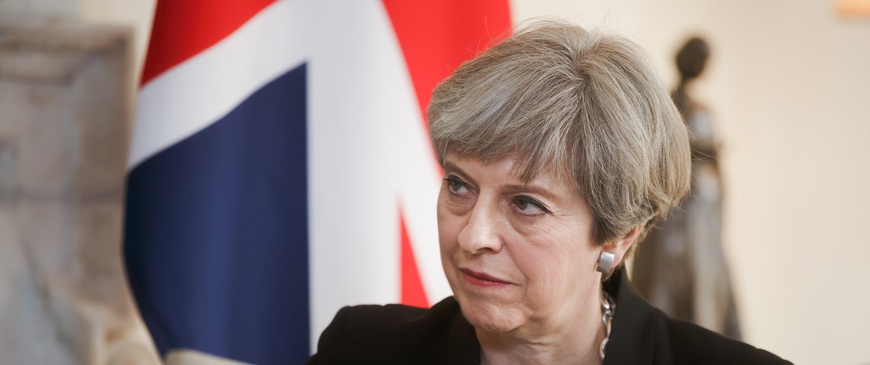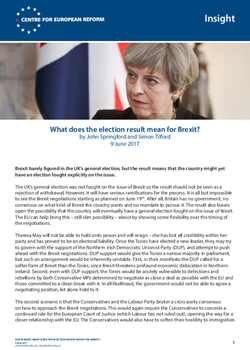
What does the election result mean for Brexit?
Brexit barely figured in the UK's general election, but the result means that the country might yet have an election fought explicitly on the issue.
The UK’s general election was not fought on the issue of Brexit so the result should not be seen as a rejection of withdrawal. However, it will have serious ramifications for the process. It is all but impossible to see the Brexit negotiations starting as planned on June 19th. After all, Britain has no government, no consensus on what kind of Brexit the country wants and no mandate to pursue it. The result also leaves open the possibility that the country will eventually have a general election fought on the issue of Brexit. The EU can help bring this – still slim possibility – about by showing some flexibility over the timing of the negotiations.
Britain has no govt, no consensus on what kind of #Brexit the country wants & no mandate to pursue it
Theresa May will not be able to hold onto power and will resign – she has lost all credibility within her party and has proved to be an electoral liability. Once the Tories have elected a new leader, they may try to govern with the support of the Northern Irish Democratic Unionist Party (DUP), and attempt to push ahead with the Brexit negotiations. DUP support would give the Tories a narrow majority in parliament, but such an arrangement would be inherently unstable. First, in their manifesto the DUP called for a softer form of Brexit than the Tories, since Brexit threatens profound economic dislocation in Northern Ireland. Second, even with DUP support, the Tories would be acutely vulnerable to defections and rebellions by both Conservative MPs determined to negotiate as close a deal as possible with the EU and those committed to a clean break with it. In all likelihood, the government would not be able to agree a negotiating position, let alone hold to it.
The second scenario is that the Conservatives and the Labour Party broker a cross-party consensus on how to approach the Brexit negotiations. This would again require the Conservatives to concede a continued role for the European Court of Justice (which Labour has not ruled out), opening the way for a closer relationship with the EU. The Conservatives would also have to soften their hostility to immigration from the EU: the Labour Party wants some controls on EU immigration – such as limits on low-skilled immigration from the EU – but is not as hard-line as the Conservatives. While Labour’s position is still inconsistent with continued membership of the single market, it is unacceptable to Tory eurosceptics, making it far from obvious how the new Tory leadership could sign up to such a cross-party solution. For its part, the Labour Party will have little incentive to let the Tories govern and negotiate Brexit, even a softer Brexit that is more to their liking. Perhaps the most striking thing about the election campaign was the absence of any national consensus that Brexit is the most serious challenge facing the country. Without that, an implicit grand coalition on the issue is implausible.
Thus the combination of a hung parliament and the Brexit negotiations will mean that any coalition or minority government is likely to be very unstable, making fresh elections likely. There is a fair chance that the campaign in such an election would finally confront the painful realities of Brexit. After all, the economic impact of Brexit is starting to come through: growth is weak, inflation rising and real wages falling. The uncertainty created by a hung parliament will also hit economic activity. Immigration from the EU is likely to fall as the British economy weakens and growth across the EU accelerates. This could create the political space for the left to push for a softer form of Brexit.
While Jeremy Corbyn is a lifelong eurosceptic, he raised turnout among younger, pro-Remain voters. As a group, they do not share the anti-immigrant politics of their grandparents. The Conservatives did not make the inroads in the North of England and Wales, Labour’s eurosceptic heartlands, that many predicted, and Labour will not want to open up the possibility of a Tory resurgence in these areas by going too soft on free movement. But, while the vast majority of UK voters think that the referendum should be respected, there is far less consensus over what form of Brexit should be pursued. And since the economic reality of Brexit is already starting to bite, Labour might be able to campaign on a softer platform.
How will the 27 respond to the general election result? France’s prime minister, Edouard Philippe, told French radio this morning that one should not “read a shift in British public opinion into these results”. And the EU is likely to say no to any attempt by the British to pause Article 50. After all, the shorter the window that the British have to negotiate, the more leverage the EU has in the negotiations.
The shorter the window the British have to negotiate, the more leverage the #EU has in the negotiations
But the EU’s leaders should also remember that a softer form of Brexit serves both their economic and political purposes. Britain would suffer most from higher barriers to trade, investment and the movement of people, but these do impose costs on the rest of the EU too. If the next British government chooses to pursue a more moderate form of Brexit, this would serve as a powerful reminder to continental eurosceptics: the EU has advantages that even Britain finds difficult to walk away from. While it is probably too much to expect the EU to agree to stop the clock, tough rhetoric from European leaders will not serve the Union’s interests.
The general election result defied predictions and has thrown the Brexit process into disarray. It is impossible to come to any firm conclusions about what will happen. But one thing is certain: the British could not agree on who they wanted to lead them or what sort of country they want to live in. There is very little time to forge a new consensus.
This article has been amended to remove the claim that 72 per cent of 18-24 year olds voted.
John Springford is director of research and Simon Tilford is deputy director of the Centre for European Reform.


Add new comment